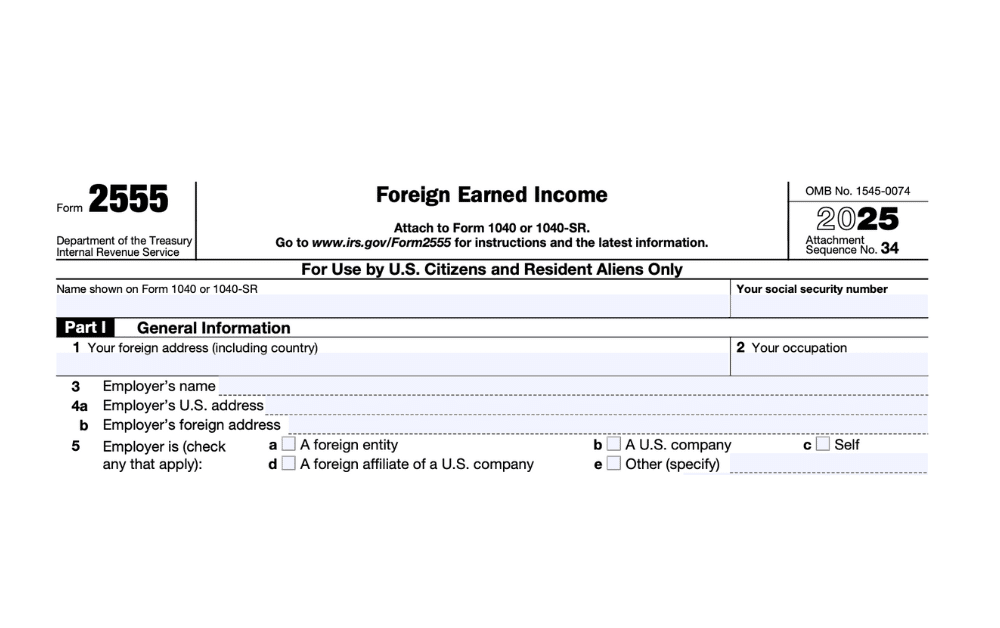Mid-Year Tax Filing: Optimizing Your Dual Status Year

- How Does My Residency Change Date Affect My Taxes?
- When Should I Establish U.S. Residency if I'm Moving to the United States?
- When Should I Terminate My U.S. Residency if I'm Moving Abroad?
- What Transactions Should I Complete Before My Residency Changes?
- How Do I Establish My Residency Ending Date Properly?
- How Can Extensions Help with My Dual Status Filing?
- What Dual Status Timing Mistakes Should I Avoid?
- What's My Timeline for Dual Status Move Planning?
- Working with Greenback: Expert Dual Status Planning
- Related Resources
Your move date determines whether income is taxed at U.S. worldwide rates or escapes U.S. taxation entirely. According to the IRS, when you establish or terminate U.S. residency midyear, you become a dual status alien, where different tax rules apply to each portion of the year. Strategic timing of your residency change and proper date establishment can save thousands by controlling which income falls under each tax treatment.
How Does My Residency Change Date Affect My Taxes?
When you move to or from the United States midyear, your tax year splits at your residency starting or ending date. Everything before that date follows one set of rules; everything after follows completely different rules.
The Resident vs. Nonresident Split
Resident Period Taxation:
- All worldwide income is taxable (wages from any country, foreign investments, rental income abroad)
- Progressive U.S. tax rates apply (10% to 37%)
- Limited deductions available (no standard deduction unless making spousal election)
Nonresident Period Taxation:
- Only U.S.-source income is taxable
- Foreign-source income is completely excluded
- Effectively connected income is taxed at progressive rates
- Passive income (FDAP) is taxed at a flat 30% (or treaty rate)
Example – One Day Changes Everything:
Marina moves from Moscow to New York on July 1, 2025. Her Russian employer pays her $120,000 annually.
- Income earned June 30 (nonresident): Not taxable to U.S.
- Income earned July 1 (resident): Taxable as worldwide income.
Tax impact: Each day as a resident adds approximately $328 to her U.S. taxable income ($120,000 ÷ 365 days).
Plan Your Mid-Year Move Without Tax Surprises.
When Should I Establish U.S. Residency if I’m Moving to the United States?
Your residency starting date controls when foreign income becomes taxable to the U.S. Delaying residency establishment by even a few weeks can significantly reduce your first-year U.S. tax bill.
Arriving Late in the Year
Tax advantage: Income earned abroad during your nonresident period (before arrival) escapes U.S. taxation entirely.
When this works:
- You have high foreign income that would be taxed abroad anyway
- Your foreign country provides full-year resident benefits you’d lose with partial-year status
- You have significant passive foreign income (investments, rental properties)
- You can complete high-value transactions before establishing residency
Example – December Arrival:
Chen earns $150,000 annually in Singapore (0% capital gains tax). He’s negotiating a U.S. job offer with flexibility on the start date.
Option 1: Arrives November 1
- Nonresident period: Jan-Oct (foreign income not taxable)
- Resident period: Nov-Dec ($25,000 becomes taxable worldwide income)
Option 2: Arrives December 20
- Nonresident period: Jan-Dec 19 (foreign income not taxable)
- Resident period: Dec 20-31 ($4,100 becomes taxable worldwide income)
Delaying arrival by 7 weeks saves approximately $5,200 in first-year U.S. taxes by keeping more foreign income in the nonresident period.
Arriving Early in the Year
Tax advantage: Maximize time for employer benefits (401(k) matching, health insurance), establish full Physical Presence Test qualification for the following year’s Foreign Earned Income Exclusion.
When this works:
- You’re moving from a higher-tax country (can claim Foreign Tax Credits)
- Your foreign income was minimal or already heavily taxed
- You want to maximize U.S. retirement account contributions
- You’re planning to qualify for FEIE in future years and need presence days
Example – Early Arrival for Future FEIE:
Paolo plans to live in the U.S. temporarily (2-3 years) before moving abroad permanently. Arriving January 15, 2025, establishes:
- Strong presence day foundation for a substantial presence test
- Earlier ability to claim bona fide residence if he establishes foreign residence later
- Full calendar year of U.S. retirement contributions
When Should I Terminate My U.S. Residency if I’m Moving Abroad?
Your residency ending date determines when foreign income becomes taxable to the U.S. Establishing an earlier termination date can exclude months of foreign income from U.S. taxation.
Departing Early in the Year
Tax advantage: Foreign income earned after your residency ends becomes non-U.S. source income, completely escaping U.S. taxation.
Critical requirement: You must file a statement with the IRS establishing your earlier termination date by proving:
- Your last day of U.S. presence was followed by
- A tax home in a foreign country for the rest of the year
- A closer connection to that foreign country
Example – Early Departure Excludes 9 Months of Income:
David, a Green Card holder, moved from California to London on March 31, 2025. He started a job in the UK on April 1, earning £90,000 annually.
Without establishing an earlier ending date:
- Residency ends: December 31, 2025
- UK salary Apr-Dec: £67,500 taxable as worldwide income
- U.S. tax (after Foreign Tax Credit): ~$6,500
With an earlier ending date (March 31):
- Residency ends: March 31, 2025
- UK salary Apr-Dec: £67,500 is non-U.S. source income
- U.S. tax: $0
Correctly establishing the March 31 termination date saves $6,500 by excluding the UK income from U.S. taxation.
Departing Late in the Year
Tax advantage: Complete high-value U.S. transactions while still a resident (property sales with exclusions, retirement account conversions with standard deductions).
When this works:
- You’re selling U.S. property and want to use the $250,000/$500,000 principal residence exclusion
- You’re planning Roth conversions and benefit from resident tax treatment
- You have significant U.S. source income that is better taxed at progressive rates as a resident
Example – Property Sale Before Departure:
Lisa lived in Miami for 8 years and plans to move to Portugal. She owns a condo with a $400,000 gain. Departing November 1 instead of February 1 allows her to:
- Complete the sale in October while still a resident
- Claim the $250,000 principal residence exclusion (must own and live in property 2 of last 5 years)
- Pay U.S. tax only on $150,000 of gain
If she had sold as a nonresident, the exclusion wouldn’t apply the same way.
What Transactions Should I Complete Before My Residency Changes?
Strategic timing of financial transactions around your residency starting or ending date maximizes tax efficiency.
Before Establishing U.S. Residency (Complete as Nonresident)
- Foreign property sales: Capital gains on foreign property sold before you become a U.S. resident are not subject to U.S. taxation.
- Foreign investment gains: Realize gains on foreign stocks, mutual funds, or other investments before establishing residency. Foreign capital gains during your nonresident period escape U.S. tax.
- Stock option exercises: If you have foreign company stock options, exercise before establishing U.S. residency to avoid U.S. taxation on the spread.
- Foreign business sales: Time the closing of any foreign business sale before your residency starting date.
Example – Investment Gain Timing:
Yuki is moving from Japan to the U.S. on H-1B in August 2025. She has Japanese stocks with ¥15 million unrealized gains (~$100,000).
Sells in July (before residency):
- Gain realized during nonresident period
- U.S. tax: $0 (foreign source, nonresident)
- Only the Japanese tax applies
Sells in September (after residency):
- Gain realized during the resident period
- U.S. tax on $100,000 gain: ~$20,000 (after Foreign Tax Credit)
- Japanese tax also applies
Timing the sale before arrival saves $20,000 in U.S. taxes.
Before Terminating U.S. Residency (Complete as Resident)
- U.S. property sales with exclusions: If you qualify for the principal residence exclusion, complete the sale before giving up residency.
- Roth conversions: Converting a Traditional IRA/401(k) to a Roth while still a resident allows you to claim standard deductions and credits that won’t be available as a nonresident.
- Stock compensation acceleration: If your employer allows, negotiate acceleration of RSU vesting or option exercises to occur before you terminate residency.
- U.S. retirement account contributions: Make final contributions to 401(k) or IRA before residency ends (contributions generally require U.S. earned income).
Example – Roth Conversion Timing:
James is moving from Boston to Singapore in March 2025. He has a $150,000 Traditional IRA he wants to convert to Roth.
Converts in February (as a resident):
- Can claim $29,200 standard deduction (married filing jointly)
- Taxable conversion amount: $120,800
- U.S. tax: ~$18,500
Converts after moving (as nonresident):
- No standard deduction available
- Taxable conversion amount: $150,000
- U.S. tax: ~$28,000
Converting before departure saves ~$9,500 by accessing the standard deduction.
How Do I Establish My Residency Ending Date Properly?
The default residency ending date is December 31 of the year you leave. However, you can establish an earlier date by filing a required statement with your tax return.
Requirements for an Earlier Termination Date
You must prove all three elements:
- Your last day of U.S. physical presence, followed by
- Maintaining a tax home in a foreign country for the rest of the year
- Having a closer connection to that foreign country than to the U.S.
What Must I Include in My Statement?
The IRS requires a signed statement attached to your tax return containing:
Documentation of final U.S. presence:
- Exact date of last U.S. presence
- Evidence (flight tickets, passport stamps, foreign employment start date)
Foreign tax home evidence:
- Foreign employment contract
- Foreign apartment lease
- Utility bills in a foreign country
- Foreign country tax registration
Closer connection evidence:
- Location of permanent home
- Location of family
- Location of personal belongings
- Voter registration
- Driver’s license
- Bank accounts
- Social/religious affiliations
Example – Proper Statement Filing:
Maria left the U.S. on April 15, 2025, to start a permanent job in France. Her statement includes:
- Flight receipt showing April 15 departure
- French employment contract starting April 16
- French apartment lease beginning April 16
- French utility bills May-December
- Evidence she closed U.S. bank accounts, cancelled U.S. driver’s license, registered to vote in France
The IRS accepts April 15 as her residency ending date. Her French salary from April 16 onward is non-U.S. source income.
Navigating dual status timing and residency date establishment? Greenback specializes in helping foreign nationals determine the optimal timing for their move, establish proper residency start and end dates, and coordinate transaction timing around residency changes to minimize tax liability. See how we help dual status filers ->
How Can Extensions Help with My Dual Status Filing?
The strategic use of filing extensions offers critical advantages when optimizing dual status treatment.
First-Year Choice Election Extension
If you arrived in the U.S. late in the year and want to make the First-Year Choice election (be treated as dual status even though you don’t meet the substantial presence test until the following year), you need time to confirm you’ll meet next year’s test.
Strategy: File Form 4868 requesting an extension to October 15, explaining you need time to determine if you’ll meet the following year’s substantial presence test. This gives you until mid-October to confirm your qualification before submitting your application.
Example:
Javier arrived in the U.S. on November 1, 2025. He wants to file jointly with his U.S. citizen spouse, which requires making the First-Year Choice. As of April 15, 2026, he hasn’t yet accumulated enough 2026 presence days to confirm he’ll meet the substantial presence test.
He files Form 4868 requesting an extension until October 15, 2026. By August 2026, he has confirmed that he’ll meet the 2026 test, so he files his 2025 dual-status return with the First-Year Choice election.
Foreign Tax Credit Calculation Extension
If you paid foreign taxes during your resident period and need time to gather foreign tax payment documentation or calculate optimal Foreign Tax Credit allocation, extensions provide the necessary time.
Strategy: File Form 4868 requesting an extension to October 15, giving you six additional months to gather foreign tax payment receipts, foreign tax returns, and calculate the credit correctly using Form 1116.
What Dual Status Timing Mistakes Should I Avoid?
Mistake 1: Not documenting exact residency dates
Without proper documentation of your first or last day of U.S. presence, the IRS will use default dates that may be unfavorable. Keep flight receipts, passport stamps, and documentation of employment start/end dates.
Mistake 2: Realizing significant gains immediately after becoming a resident
Wait to complete the foremost financial transactions until you understand their tax treatment under your new status. A few weeks can mean the difference between taxable and non-taxable gains.
Mistake 3: Not filing the residency ending date statement
Many dual-status filers don’t realize they need to file a specific statement to establish their earlier termination date. Without it, the IRS treats residency as continuing through December 31, making all foreign income taxable.
Mistake 4: Confusing payment date with earning date
Income allocation depends on when income was earned (services performed), not when payment was received. Track this carefully for year-end bonuses, stock compensation, and multi-month projects.
Mistake 5: Not considering treaty tie-breaker rules
If you’re a tax resident of both the U.S. and your home country under each country’s domestic law, treaty tie-breaker rules may override the substantial presence test and determine you’re a foreign country resident for the entire year.
Mistake 6: Timing moves for job reasons without tax planning
Most foreign nationals choose their move date based on job start dates, lease availability, or family considerations. Build in flexibility to optimize tax timing when possible.
What’s My Timeline for Dual Status Move Planning?
3-6 Months Before Move:
- Calculate tax impact under different potential move dates
- Model income allocation scenarios
- Identify transactions to complete before residency change
- Consult tax advisors in both countries
1 Month Before Move:
- Complete planned financial transactions
- Gather documentation for residency date proof
- Set up systems for tracking presence days
- Calendar tax filing deadlines and extension dates
Move Date:
- Document exact arrival/departure with all receipts
- Keep evidence of foreign residence establishment
- Begin tracking all presence days going forward
1-3 Months After Move:
- File residency ending date statement (if applicable)
- Set up foreign tax home documentation
- Begin gathering documents for dual status return
- Calculate estimated tax liability
Confused about dual status timing for your mid-year move? Greenback specializes in helping foreign nationals optimize arrival and departure timing, establish residency dates correctly, and coordinate transaction timing around residency changes. See how we help dual status filers
Working with Greenback: Expert Dual Status Planning
Mid-year international moves create complex dual-status tax years, where strategic timing can save thousands. Establishing the proper residency date, managing transaction timing around residency changes, and implementing extension strategies require specialized expertise.
Get Your Dual Status Return Done the Right Way.
This article provides general information on dual-status tax planning for mid-year moves. Tax laws change frequently, and individual circumstances vary. This content is for educational purposes only and does not constitute tax or legal advice. Always consult with qualified tax professionals before making decisions about timing or tax planning.
Related Resources
Dual Status Filing:
- How to File as a Dual-Status Alien
- Form 1040 vs Form 1040-NR: Which Tax Form Should I File?
- Resident Alien vs Nonresident Alien: Tax Differences
- Resident Alien Tax Guide: New U.S. Arrivals
Moving to or from the U.S.:
- Moving Back to the U.S.: Your Expat Tax Transition Guide
- Form 1040: U.S. Individual Income Tax Return Guide


